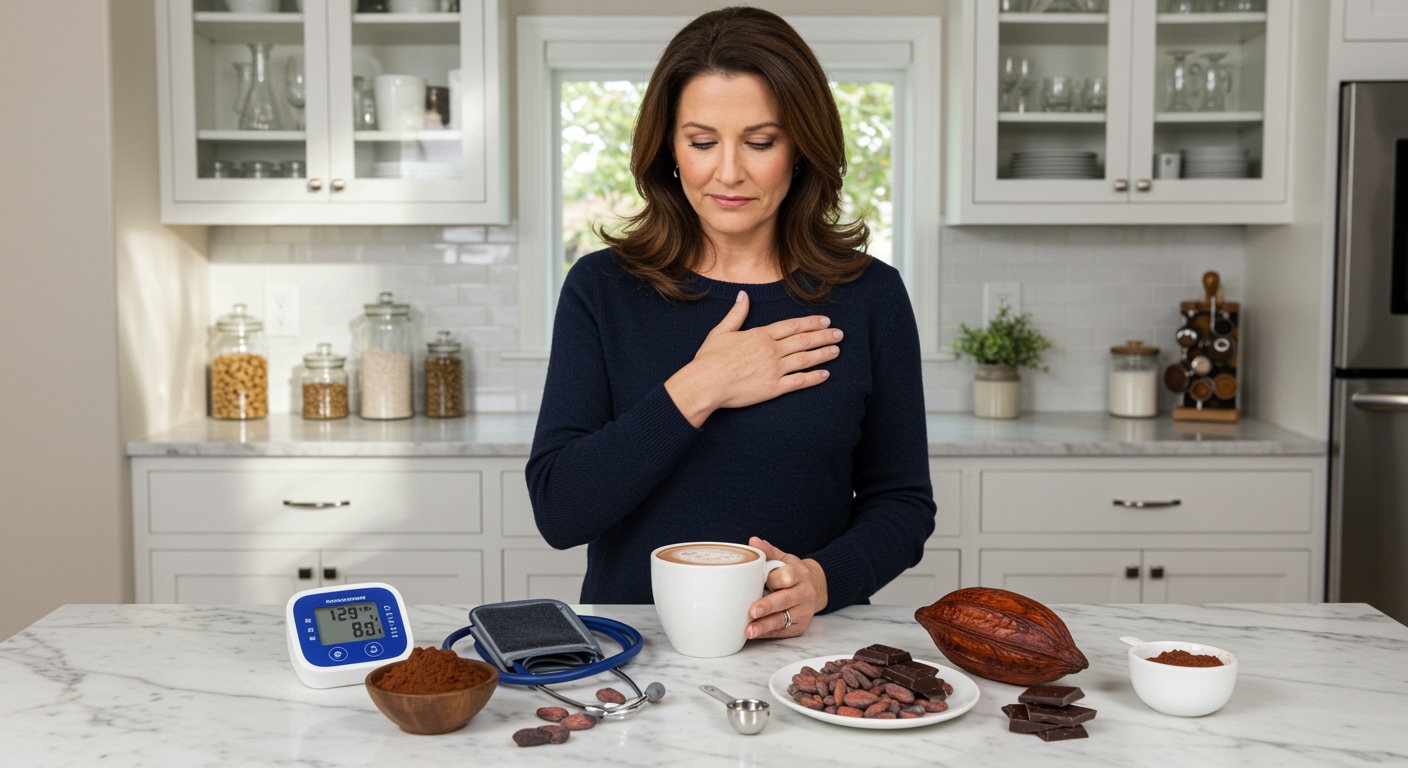✪ Key Takeaway: Cocoa may lower blood pressure further, so people with hypotension should consume it cautiously and monitor their levels.
Introduction
Your morning cup of hot cocoa might be doing more to your blood pressure than you realize.
If you already struggle with low blood pressure, you might wonder whether that delicious cocoa drink could make your symptoms worse or perhaps help stabilize your levels.
Hi, I’m Abdur, your nutrition coach and today I’m going to explain how cocoa affects low blood pressure and what you need to know before making it part of your daily routine.
How Does Cocoa Actually Affect Blood Pressure?
Cocoa contains powerful compounds called flavanols that directly impact your cardiovascular system.
These flavanols work by increasing the production of nitric oxide in your blood vessel walls.
Nitric oxide acts like a natural vasodilator, which means it helps your blood vessels relax and widen.
When your blood vessels become wider, blood flows more easily through them, and this typically results in lower blood pressure readings.
Multiple studies have shown that regular cocoa consumption can reduce both systolic and diastolic blood pressure by 2-5 mmHg in healthy adults.
The effect usually becomes noticeable within 2-8 weeks of consistent consumption, depending on the amount and quality of cocoa you consume.
✪ Fact: Dark chocolate with 70% cocoa content contains the highest levels of blood pressure-lowering flavanols.
What Happens When You Have Low Blood Pressure?
Low blood pressure, also called hypotension, occurs when your blood pressure readings consistently fall below 90/60 mmHg.
Your body needs adequate blood pressure to pump oxygen and nutrients to all your organs and tissues effectively.
When blood pressure drops too low, you might experience dizziness, fatigue, nausea, or even fainting spells.
Some people naturally have low blood pressure without any symptoms, while others develop it due to dehydration, certain medications, or underlying health conditions.
The key concern with low blood pressure is ensuring your brain and other vital organs receive adequate blood flow at all times.
Unlike high blood pressure, which often requires treatment, low blood pressure typically only needs attention when it causes troublesome symptoms.
✪ Note: Blood pressure naturally fluctuates throughout the day, so single low readings may not indicate hypotension.
Should You Avoid Cocoa With Low Blood Pressure?
The answer depends on your specific situation and how your body responds to cocoa consumption.
If you have mild low blood pressure without symptoms, small amounts of cocoa might not cause significant problems.
However, if you already experience dizziness, fatigue, or fainting from low blood pressure, adding cocoa could potentially worsen these symptoms.
The blood pressure-lowering effects of cocoa can be cumulative, meaning regular consumption might gradually reduce your levels further over time.
Some people with low blood pressure find that timing their cocoa consumption carefully helps them avoid problematic drops in blood pressure.
For example, consuming cocoa after meals when blood pressure naturally rises might be safer than having it on an empty stomach.
The safest approach is to monitor your blood pressure readings before and after introducing cocoa to see how your body specifically responds.
✪ Pro Tip: Start with small amounts of cocoa and track your blood pressure response for at least two weeks.
What Type of Cocoa Is Safest for Low Blood Pressure?
Not all cocoa products have the same blood pressure effects, so choosing the right type matters significantly.
Pure cocoa powder contains the highest concentration of flavanols, making it the most potent for lowering blood pressure.
Milk chocolate contains much lower levels of cocoa and higher amounts of sugar and fat, which may have different cardiovascular effects.
Hot cocoa made with milk and sugar might actually help stabilize blood pressure better than pure cocoa due to the added sodium and calories.
The processing method also affects flavanol content, with Dutch-processed cocoa containing fewer active compounds than natural cocoa powder.
If you choose to consume cocoa with low blood pressure, consider starting with processed varieties or cocoa mixed with other ingredients that might offset the blood pressure-lowering effects.
✪ Fact: Adding a pinch of salt to your cocoa drink may help counteract potential blood pressure drops.
When Should You Talk to Your Doctor?
Certain situations require medical guidance before adding cocoa to your diet with low blood pressure.
If you take medications for any heart condition, blood pressure, or circulation problems, cocoa could interact with these treatments.
People with severe hypotension or those who have experienced fainting episodes should definitely consult their healthcare provider before consuming regular amounts of cocoa.
Your doctor can help you understand whether cocoa fits safely into your overall treatment plan and dietary approach.
They might recommend specific timing, amounts, or types of cocoa products that work best with your individual health profile.
Some doctors may suggest monitoring your blood pressure more frequently when first introducing cocoa to track any concerning changes.
✪ Note: Keep a blood pressure log when trying new foods to identify patterns and potential triggers.
The Bottom Line
Cocoa can lower blood pressure, which means people with hypotension should approach it cautiously and monitor their response carefully.
Your health is too important to guess about, so always choose monitoring over hoping when it comes to blood pressure management.
I would love to hear about your experiences with cocoa and low blood pressure, so please share your thoughts, questions, or concerns in the comments below.
References
At NutritionCrown, we use quality and credible sources to ensure our content is accurate and trustworthy. Below are the sources referenced in creating this article:
- PMC: Cocoa and Chocolate in Human Health and Disease
- Cochrane: Effect of Cocoa on Blood Pressure
- PMC: Cocoa Flavanols and Blood Pressure
- Frontiers in Nutrition: Cocoa and Cardiovascular Health





